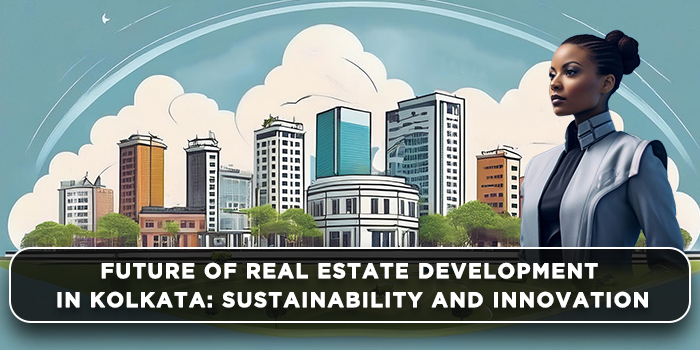As India’s population count is projected to touch 1.5 billion by 2030, the demand for energy is also expected to grow exponentially. Given this scenario, the onus is particularly heavy on the real estate sector, which accounts for over one-fifth of the country’s energy demand, to build sustainably and adopt technological innovation in every sphere, from planning to design and construction to management.
According to a World Economic Forum report, the real estate sector uses around 40% of the world’s raw materials and is responsible for over 20% of the global greenhouse gas emissions. Clearly, this is the time for the realty sector to step up and adopt components related to environmental, social and governance (ESG) in its upcoming projects so that we can look forward to an equitable, efficient and sustainable economy.

Developers in Kolkata have been quite proactive in adopting sustainable building practices in keeping with growing customer awareness and constant encouragement from the government. Given the fact that most of the infrastructure required in Indian urban areas by 2030 is yet to be constructed, the potential for the real estate industry to embrace technology-driven sustainable practices is huge.
Here are some instances of innovation and sustainability going forward:
# Energy-efficient constructions: These buildings constitute the fulcrum of the green-building movement. Using modern insulation materials, energy-efficient windows, intelligent heating, ventilation and air-conditioning systems (HVAC), these buildings can significantly lower carbon emissions and reduce energy waste by adapting to temperature fluctuations and level of occupancy. Using smart lighting and occupancy sensors also helps reduce energy consumption and improve comfort levels, thus minimizing impact on environment. Such energy-efficient structures also lower operational costs and stand to reap the rewards of green bonds and climate-linked funds.
# Opting for smart homes: Cutting-edge technology is at the heart of sustainable solutions, creating ‘smart homes’. These residential units put advanced technology to optimum use by introducing contraptions like smart thermostats, lighting systems and remote-controlled energy-efficient appliances. Residents can thus calibrate power consumption as per their needs or occupancy levels, thus curbing waste and saving on power bills. Smart homes can also be equipped to run on renewable energy like solar panels, as Kolkata receives sunshine almost throughout the year.
# Using AI-powered tools: AI is transforming the way the real estate sector works, like so many other things. Today, tools for energy audits that are powered by AI, can review consumption cycles and offer solutions towards more energy-efficient systems. Developers on their part not only save costs, they can also reduce their carbon footprint. Waste-management modules driven by AI can look at data from sensors to forecast production cycles and streamline collection routines. This can significantly cut costs and impact on environment.
# BIM or Building Information Modelling: For long, the Indian real estate sector has languished in the throes of antiquated technologies, systems and business models. BIM is a modern tech solution that has transformed the process of design, construction and management of buildings. This system deploys advanced software to make digital clones of structures, thus enabling architects, engineers and building contractors to forge effective ties, optimizing design and construction processes. Through simulation of performance, energy and material usage, BIM can spot potential loopholes as well as scope for improvement. Needless to say, this helps minimize environmental impact significantly.
To conclude:
The main obstacle to adoption of new technology is always an all-round lack of understanding across the gamut of stakeholders, not to mention technical nous and the resources for effective implementation. Hence, the communication of the need for innovation to achieve sustainability goals is of paramount importance. Globally, the construction industry is moving towards responsible corporate behaviour. There’s no reason why we can’t. The future of real estate is bright if builders can keep pace with the latest advances in technology and fast-track sustainable practices.
Disclaimer : Information contained and transmitted by us are for information purposes only. All views and/or recommendations are those of the concerned author personally and made purely for information purposes. Nothing contained in the articles should be construed as business, legal, tax, accounting, investment or other advice or as an advertisement or promotion of any project or developer or locality. Pioneer Property Management Ltd. does not offer any such advice. No warranties, guarantees, promises and/or representations of any kind, express or implied, are given as to (a) the nature, standard, quality, reliability, accuracy or otherwise of the information and views provided in (and other contents of) the articles or (b) the suitability, applicability or otherwise of such information, views, or other contents for any person’s circumstances. We shall not be liable nor shall be held responsible in any manner for any action taken based on the published information (whether in law, contract, tort, by negligence, products liability or otherwise) for any losses, injury or damage (whether direct or indirect, special, incidental or consequential) suffered by such person as a result of anyone applying the information (or any other contents) in these articles or making any investment decision on the basis of such information (or any such contents), or otherwise. The users should exercise due caution and/or seek independent advice before they make any decision or take any action on the basis of such information or other contents.